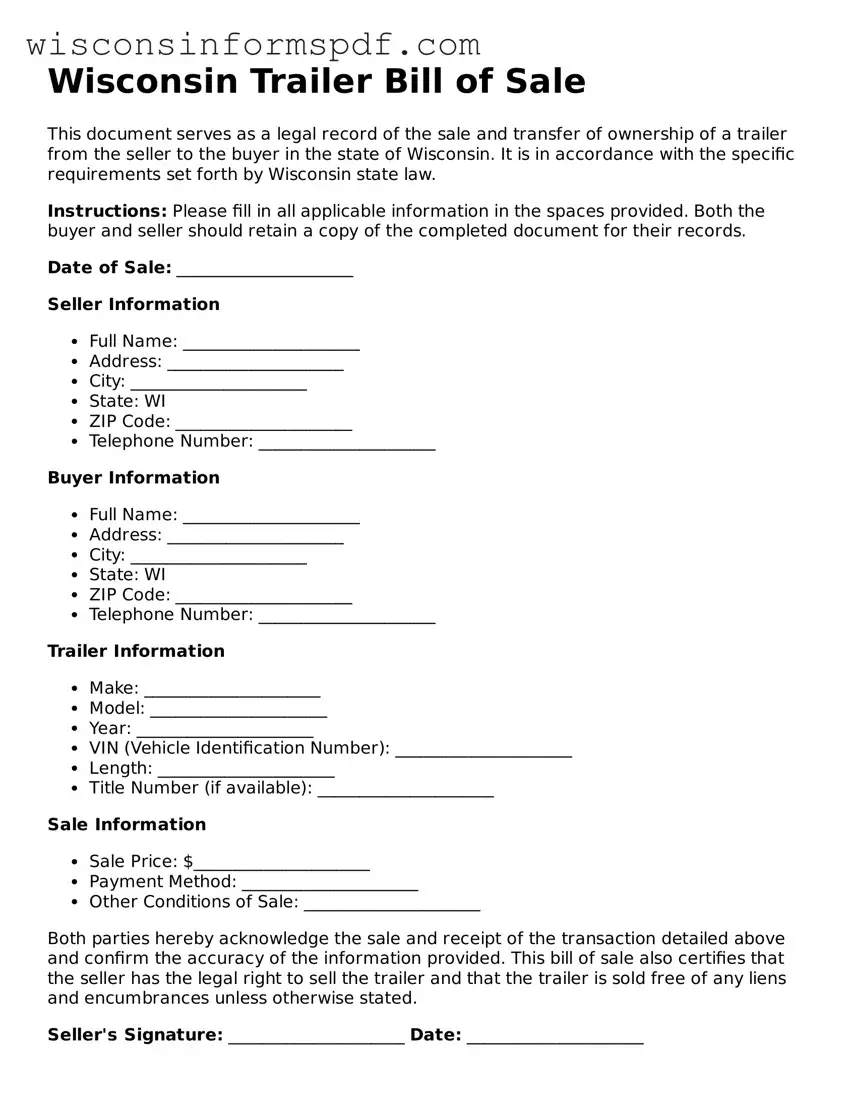What is a Trailer Bill of Sale form in Wisconsin?
A Trailer Bill of Sale form in Wisconsin is a legal document that records the sale and purchase of a trailer. It acts as proof of transaction between the buyer and the seller, detailing the transfer of ownership.
Why do I need a Trailer Bill of Sale form in Wisconsin?
You need this form to legally document the transfer of ownership and to register the trailer with the Wisconsin Department of Transportation (WisDOT). It's also crucial for the buyer's personal records and may be needed for tax purposes.
What information should be included in the form?
The form should include the seller's and buyer's names and addresses, a detailed description of the trailer (including make, model, year, and Vehicle Identification Number), the sale date, and the sale price. Signatures from both parties are also required.
Do both parties need to sign the Wisconsin Trailer Bill of Sale?
Yes, both the seller and the buyer must sign the form. Their signatures confirm that both parties agree to the terms and conditions of the sale and that the information provided is accurate.
Is notarization required for the form in Wisconsin?
No, notarization is not a requirement for the Trailer Bill of Sale in Wisconsin. However, having the document notarized can add an extra layer of legal protection and authenticity to the document.
How do I register a trailer in Wisconsin using the Bill of Sale?
To register the trailer, take the completed Bill of Sale to your local WisDOT office along with any other required documents, such as proof of insurance and a title transfer form, if applicable. You will also need to pay the registration fee.
Can I use a generic Bill of Sale form for a trailer transaction in Wisconsin?
While a generic Bill of Sale can be used, it's recommended to use a form that is specifically designed for trailer transactions in Wisconsin to ensure it meets all state-specific requirements.
What if the trailer is coming from out of state?
If the trailer is purchased from out of state, it still needs to be registered in Wisconsin. Ensure the Bill of Sale complies with Wisconsin's requirements and check if additional documentation is needed for an out-of-state trailer.
Do I need to do anything if I lose my Bill of Sale?
If you lose your Bill of Sale, try to obtain a copy from the other party if possible. If not, drafting a new Bill of Sale with the same information and getting it signed again by both parties is advisable.
Are there any specific requirements for selling a boat trailer in Wisconsin?
Yes, the process for selling a boat trailer in Wisconsin is similar to selling a regular trailer, but make sure to include information specific to boat trailers, such as the type and size. Additionally, ensure compliance with any regulations specific to boats and watercraft.

